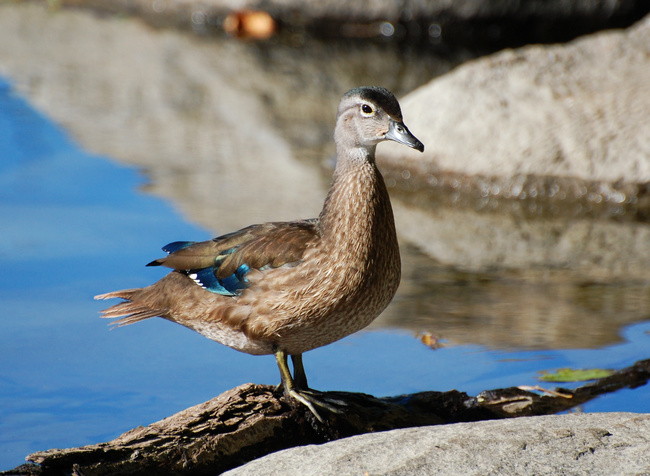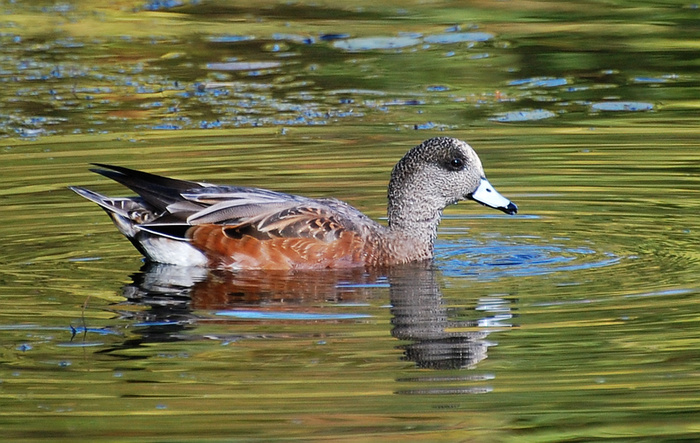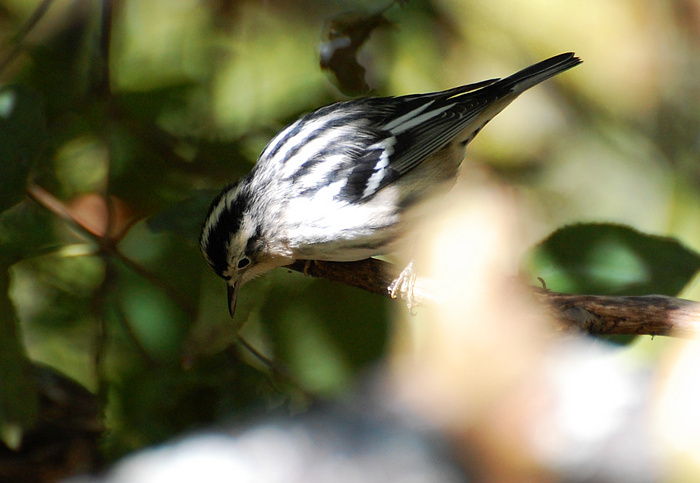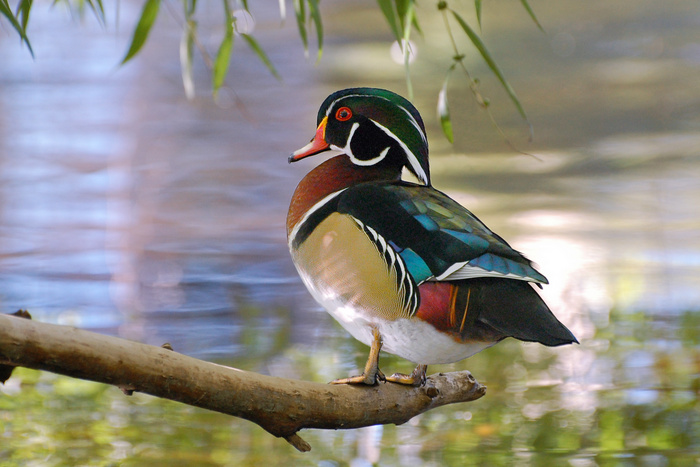
Poise
October 1st, 2009

Juvenile Wood Duck, on the Rideau a few weeks ago.
It was a brisk morning at Andrew Haydon Park yesterday, with cold temperatures, strong winds and an occasional dousing of rain. I found it invigorating--at least until I'd been out in it for four hours, after which, I was pretty much done! The water level on the Ottawa River has finally gone down substantially, exposing habitat (i.e. mud flats) for sandpipers and plovers. Killdeer were foraging in the mud at the west end of the park, along with several Spotted Sandpipers and a pair of Lesser Yellowlegs. The usually Mallards in that area were joined by a small group of Blue-Winged Teal, and one male Gadwall. I can count on one hand the number of times I've seen Gadwalls, and I love their silvery plumage, so that was exciting.
The Brant has been at the park all summer and now into fall. I'm beginning to wonder when and if he'll leave. Ottawa winter would be hard on him.
Around midday another birder game along, toting scope and binoculars. I asked for his help to confirm (or correct) my ID on the Lesser Yellowlegs, he did, and we introduced ourselves and got to chatting. He had glimpsed an unusual songbird he couldn't identify back at Dick Bell Park, walking on the rocks. The bird flushed, but he figured now that he'd been gone awhile, it might be back. So we headed over there to search for it. (Dick Bell Park is a.k.a. Nepean Sailing Club and is within walking distance west of Andrew Haydon. It's known to birders primarily as A. home to a thriving Purple Martin colony, B. a place where you might see a Purple Sandpiper in early November, and C. a place where you might see an ultra-rare Northern Wheatear, if fate smiles on you.)
We finally found a Horned Lark, of all things! He was out on the jetty flitting among the rocks like a sandpiper, and occasionally walking on the lawn. Horned Larks are birds of open country (and because I have little experience birding open country, I'd never seen one before), so I was surprised to find him there--I'm pretty sure there is no "D. place for seeing horned larks" in anyone's book! Earlier that day I had seen a small bird with undulating flight over the river, likely the same one. We suspected that he was in mid-migration, the strong winds that morning grounded him, and he just dropped down to the nearest land he could find.
On Friday morning I go back with my camera, and hope to have the kind of luck I did today.
American Wigeon
September 29th, 2009

I photographed this male American Wigeon weekend before last at Mud Lake. He gradually grew accustomed to my presence as I knelt quietly on a platform over the lake, and wended his way closer and closer as he foraged. It was especially nice when he swan into an area where nascent fall colors were reflected on the water.

When he comes out of eclipse later in fall, that vague blackish patch on his face will turn iridescent green.
I iz hummingbird!
September 25th, 2009
A small band of chickadees was enjoying some seed pods--flying down one by one and hovering to pick the seeds out.

Black-and-White Warbler
September 23rd, 2009

Too flawed for the gallery, but I actually think it's a lovely view of this warbler, skulking in thick foliage.
My rock! Mine!
September 22nd, 2009

1680x1050 wallpaper
A female Common Merganser tells an American Black Duck to shove off, now.
A Perfect Moment
September 21st, 2009
This? Was my day, made.

1680x1050 wallpaper
Adult male Wood Duck resting on the shore of the Rideau River. Not a painting, but the most fortuitous setup for a nature photo I've ever found. For comparison, I'll point back to the juvenile Wood Duck photos I posted last month. By winter, that young male in the first picture will look like this!
Fall migrants get the lead out
September 20th, 2009
Out to Mud Lake yesterday. I needed both my sweater and light jacket for the first half of the morning. The leaves were definitely turning. Apropos of both these facts, migrant songbirds were the most abundant I've seen them since that epic September 1st! Six species of warblers (Yellow-Rumped, Black-Throated Blue, Black-Throated Green, Northern Parula, Palm, Black-and-White), and probably more that I didn't spot. White-Throated Sparrow numbers continue to swell, as does the number of American Wigeons on the pond. An Osprey appeared briefly over the rapids.
By far most of the warblers are juveniles now (this year's young), which means they don't have much color to them, and even the adults are now transitioning into their duller non-breeding plumage. But what they lack in beauty, they make up for in numbers.
Today I went back with a friend and her mother in tow. I'm pleased to report that Mud Lake brought out all its charm for the occasion. I've been going there so long there are certain things I take for granted, and I forgot what an effect those things can have on a newcomer. So while I was looking around going "look--a Black-Throated Green Warbler!" my guests were going, "look--CHICKADEES!"
The chickadees at Mud Lake are remarkably tame. They are brave and intelligent birds, and have long since learned that ML is one of the places where, if they flutter around and act cute, humans will feed them. They'll land right in the palm of your hand (I have also had them land on my binoculars, my field guide, and my camera), and the sensation when those two little sets of claws clasp around your fingers is quite something.
Ring-Necked Ducks have arrived on the pond. These handsome diving ducks pass through Mud Lake each fall, and swell to over a hundred in number by mid-October, usually clustered way out in the water (binoculars essential, spotting scope even better). Right now the males are somewhat dingy-looking, as they haven't entirely come out of eclipse yet.
In the east part of the conservation area is a shallow seasonal swamp. Normally it's dried up by September, but because of our unusually wet summer it's still there. A large flock of residents and migrants was congregated in the area, and by some group wisdom, they had all agreed that one particular bit of the swamp made a perfect birdbath. They took turns, hopping into the water one by one--robins, nuthatches, warblers, sparrows--and splishing around.
Except for one or two juveniles, Wood Ducks were conspicuous by their absence. (That's unusual for this time of year. Perhaps the water's too deep for their liking.) However, when I went walking on my own along the Rideau River this afternoon, camera in hand, I was thrilled to find three adult males resting on a branch over the water, back from eclipse into their full colorful breeding plumage. They remained for some time, relatively unperturbed as I crept around them, looking for the perfect angle with the perfect lighting. I think I found it.
It's been a good weekend.
Widow Skimmer
September 19th, 2009

A Widow Skimmer dragonfly picks an interesting resting place.
Ruby-Crowned Kinglet, Common Grackle with snack
September 17th, 2009


1680x1050 wallpaper
King Of The Woods
September 16th, 2009
I took this while watching the grand territorial duel of a couple weeks ago.

1680x1050 wallpaper
"King of the Woods" is one of the many traditional nicknames for Pileated Woodpeckers. In this case the name is ironic since, as you know from the story, they were on a cultivated lawn with shade trees, not in the woods. That's why the lighting's so good :-)
|
